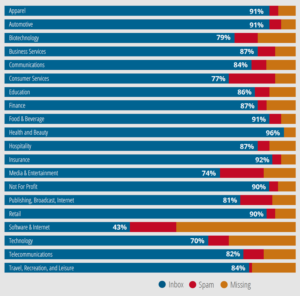Deliverability is still a challenge for most email senders. ReturnPath reports only one in five emails makes it to the inbox. Will a shared IP address or a dedicated IP address help?
ReturnPath’s Deliverability Benchmark Report shows some industries are having an especially hard time getting their emails read. Only 43% of the emails sent by the Software and Internet industry are reaching their recipients.

Given these difficulties, email senders need every tool available to stay ahead of spam filters and their competitors. That’s where dedicated IP addresses come in. Mailing from a dedicated IP address can improve deliverability rates and usually does. But it is not a guaranteed fix.
There are pros and cons to using dedicated IP addresses for email. They’re not the right choice for everyone. To help you make the right choice for your business, we wanted to walk you through the benefits of both dedicated and shared IP addresses.
The importance of IP addresses for email comes down to what’s called “sender reputation”. Your sender reputation largely determines your email deliverability rates. Your IP address is an important component of sender reputation, but it’s not the only component. Sender reputation is also influenced by the reputation of the domain name used in the “From” email address, the domain name used in the “Return-path” email address, and the domain names of any links in the email itself.
There is no universally agreed-upon arbiter of sender reputation, but there is something that comes close. It’s called “SenderScore”. SenderScore is basically a metric produced by the ReturnPath company. It is used by major email providers like Yahoo, Outlook, Windows Live, and others. You can learn more about it here. A high SenderScore helps only when you send emails to an email provider that uses it.
SenderScores can range from zero to one hundred. You’ll need a SenderScore of at least 90 to be considered a trustworthy sender. Aim for 95 or better. If you’re wondering what your SenderScore is, check ReturnPath’s online SenderScore tool.

Dedicated Versus Shared IP addresses
With a dedicated IP address, it’s just your account on that IP address. No other sender is associated with it. With a shared address, you’ll be sharing that IP address with hundreds or thousands of other senders.
Don’t dismiss shared IP addresses simply because sharing with other senders mighthurt you. Sharing an IP address could be detrimental, but if you’re working with a reliable vendor you won’t be sharing the IP address with any bad senders. Email service providers and other vendors (like SMTP2GO) will monitor how all their accounts are used.
An email vendor can require its customers to follow standard best practices for mailing and managing lists. These requirements protect the vendor, but also protect you and all the other accounts you share an IP address with. It’s very possible that you could actually benefit from sharing an IP address with other well-managed accounts. If they’ve got high engagement rates and treat their subscribers well, they could be good neighbors.
So if having a shared IP address is not so bad, why do businesses get dedicated IP addresses? Because a dedicated IP address can improve your deliverability rates – if all the other parts of your deliverability equation are in place. A business with a dedicated IP address can also apply to be ReturnPath certified (for an ongoing fee). That usually increases inbox placement rates. But for a dedicated IP to be right for you, you’ll need enough email volume to make it work.
How often do you mail?
If you mail less than three days a week and you send less than 5,000 emails on those days, a shared IP address is likely to be the best choice for you. With such a low send volume, you’d barely be able to keep your IP address “warm” enough to be recognized as a regular sender by the major ISPs.
Let’s talk about this “warm” idea. How warm an IP address is refers to how often the address is used. You’ll need to warm up your new IP address slowly or ISPs could block your emails. This happens because from the ISPs’ view, they saw no activity from an IP address for awhile, and then suddenly they see a blast of activity. To an ISP that blast of emails looks like spam, so they may block those emails. We have an entire post about how to warm up an IP address. Read it carefully if you’re considering moving to a new IP.
Even if you send more than 5,000 messages three days a week, or if your email list is larger than 20,000 subscribers, a dedicated IP address may still not be right for you.
The costs of a dedicated IP address
The next criteria to consider is price. Shared IP addresses are less expensive than dedicated IPs. How much less expensive they are depends on how many emails you’re sending, which vendor you’re working with and what other features you need. Senders can pay five to ten times more for a email deliverability package with a dedicated IP address than for one with a shared IP address. That said, if you can trust you’ll see higher deliverability rates, it might make financial sense.
Total control of your Sender Score
One of the major reasons larger companies choose a dedicated IP address is they know they’re following deliverability best practices and they want the full benefits of that work. If you know your company is doing everything possible to optimize your deliverability rates, then a dedicated IP address could be a good investment.
You might even want more than one dedicated IP address. That would allow you to send specific types of email messages from each IP address. For example, your transactional emails could go out on IP address #1. Your promotional email messages could go out on IP address #2.
There is one final benefit to having a dedicated IP address: It won’t change. Even though a shared IP address is described as singular, it’s common for shared IP address packages to rotate which IP addresses emails are sent from. Most of the time this has little effect on deliverability because all the IP addresses the vendor uses are kept in good standing. But it has the potential to cause issues here and there, and is something to keep in mind.






